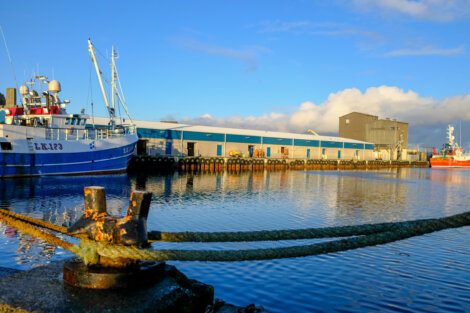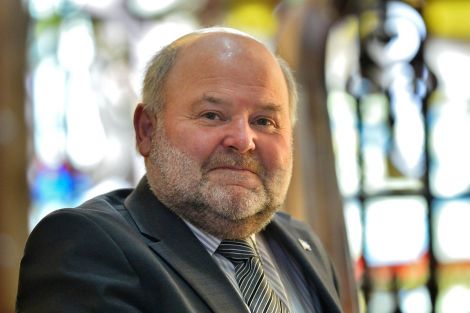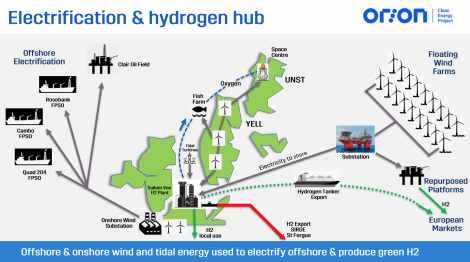Who stands for the Council? / Councillors can help industry ‘capitalise on direction world is going in’
Housing, jobs and infrastructure the key to a strong local economy
The “Who stands for the council? It’s people like you” campaign aims to encourage more candidates to come forward for May’s elections to Shetland Islands Council. In the first of a series of features looking at some of the main issues the local authority is working on, through its corporate Plan Our Ambition 2021-26, Development Committee chair Alastair Cooper has been speaking about the shape of things to come for the islands’ economy.
SHETLAND will undergo some seismic changes in the next 20 years as the country transitions to “net zero” and the local economy moves from reliance on oil and gas to renewables and other sustainable industries.
Outgoing SIC Development Committee chair Alastair Cooper feels that councillors have a crucial role to play in ensuring the necessary jobs, housing and infrastructure are in place to capitalise on those opportunities – as well as safeguarding the interests of the lucrative seafood sector.
“My passion has always been jobs,” Cooper says. “Sustainable, well-paid jobs and a decent roof over everybody’s head. If you have those two things the rest of it comes together.”
The strategy pursued by the local authority’s economic development service has changed markedly since the early 2000s – with the focus shifting away from direct investment in seafood and other industries to putting money into infrastructure, bolstering the provision of broadband to remote areas and boosting the islands’ housing stock.
High speed internet was already essential to enable people to work in remote island communities prior to the Covid-19 pandemic. But now there is an accelerating trend of people working from home it is even more important – and could even allow workers who used to be based in city offices to relocate back to Shetland.
Cooper says: “The challenge for the council is to be far-sighted enough to ensure we have infrastructure in place to allow industry to capitalise on the direction the world is going in, and we need to do more in terms of infrastructure.
“That could be roads, digital, fibre into the home. We’re going to have wind turbines – producing far more energy than the community requires, being exported – but we should be encouraging our machine operators, plant businesses, to convert to the hydrogen economy.”
He recognises more research is needed to better understand Shetland’s carbon emissions across all industrial sectors as the council pursues a “just transition” to “net zero” by the 2040s.
Through the ORION project efforts will be intensified to ensure that what remains of the oil-and-gas sector – which directly or indirectly employs some 1,000 people in Shetland – uses “pumps and utilities driven by green energy”.
‘An exciting and challenging time’
Cooper is equally clear that opportunities such as offshore renewables must be harnessed “in a way that doesn’t harm our indigenous industries”.
With an estimated value of some £400 million, the seafood industry makes up more than a third of the Shetland economy, with pelagic fish landed in huge volumes alongside significant whitefish, aquaculture and fish processing operations.
Cooper points out that the mackerel and herring fisheries have a relatively low carbon footprint and praises the sector for its efforts on that front – with the Shetland fleet catching “the same quantity or more of fish with fewer boats, better designed and with peerier engines in them”.
In addition to renewables he also points to the nascent Shetland Space Centre in Unst, a significant new economic opportunity of the sort that doesn’t come along too often.
Cooper also cites the advantages Shetland – with its cool climate, access to renewables, and digital connectivity from fibre networks and satellite download – could offer as a base allowing global data centres to operate with lower running costs than would be the case in warmer climes: “It’s an exciting time and a challenging time.”
Job creation efforts need to go hand-in-glove with ensuring workers have somewhere to live. In tandem with Hjaltland Housing Association and private builders, the council has begun investing in large-scale social housing projects over the past decade.
Around 400 energy-efficient new homes are planned for the Knab and Staneyhill sites and development is unlikely to stop there. Cooper says that, while those projects will help meet demand in Lerwick, it is also important to put the conditions in place for a vibrant economy in outlying areas too.
“We need to make sure the landward economy is thriving as well as the Lerwick economy, and I think that’s where landward councillors come in,” the North Mainland member, who is retiring after 15 years on the council, says.
He describes the “placemaking” project to carve out a new plan for the village of Scalloway as “tremendous” and said his own Delting parish and other parts of the islands could benefit from similar initiatives.
In terms of advice for anyone thinking of standing to be a councillor, he says patience is a virtue and even if you have a clear vision of what you want to achieve you “need to be prepared to play a long game”.
“You don’t get your political mandate in year one, year two or maybe even year five,” says Cooper. “That’s the way local government works. We fought for 15 years to get a fibre optic cable into Shetland. You have to keep going.”
Interested in standing to be a councillor this May? Find out more via the elections section on the SIC’s website.
Become a member of Shetland News
Shetland News is asking its readers to consider paying for membership to get additional perks:
- Removal of third-party ads;
- Bookmark posts to read later;
- Exclusive curated weekly newsletter;
- Hide membership messages;
- Comments open for discussion.
If you appreciate what we do and feel strongly about impartial local journalism, then please become a member of Shetland News by either making a single payment, or setting up a monthly, quarterly or yearly subscription.









